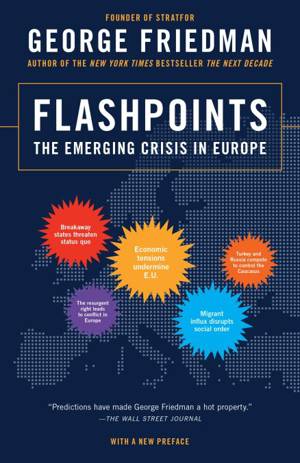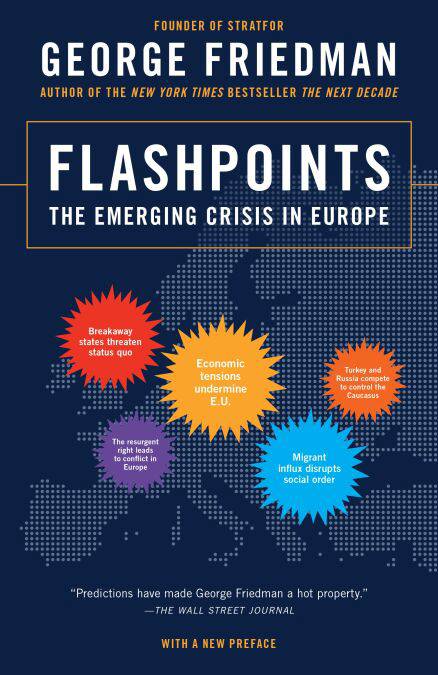
Bedankt voor het vertrouwen het afgelopen jaar! Om jou te bedanken bieden we GRATIS verzending (in België) aan op alles gedurende de hele maand januari.
- Afhalen na 1 uur in een winkel met voorraad
- In januari gratis thuislevering in België
- Ruim aanbod met 7 miljoen producten
Bedankt voor het vertrouwen het afgelopen jaar! Om jou te bedanken bieden we GRATIS verzending (in België) aan op alles gedurende de hele maand januari.
- Afhalen na 1 uur in een winkel met voorraad
- In januari gratis thuislevering in België
- Ruim aanbod met 7 miljoen producten
Zoeken
€ 5,77
+ 5 punten
Uitvoering
Omschrijving
A major new book by New York Times bestselling author and geopolitical forecaster George Friedman (The Next 100 Years), with a bold thesis about coming events in Europe. This provocative work examines “flashpoints,” unique geopolitical hot spots where tensions have erupted throughout history, and where conflict is due to emerge again.
“There is a temptation, when you are around George Friedman, to treat him like a Magic 8 Ball.” —The New York Times Magazine
With remarkable accuracy, George Friedman has forecasted coming trends in global politics, technology, population, and culture. In Flashpoints, Friedman focuses on Europe—the world’s cultural and power nexus for the past five hundred years . . . until now. Analyzing the most unstable, unexpected, and fascinating borderlands of Europe and Russia—and the fault lines that have existed for centuries and have been ground zero for multiple catastrophic wars—Friedman highlights, in an unprecedentedly personal way, the flashpoints that are smoldering once again.
The modern-day European Union was crafted in large part to minimize built-in geopolitical tensions that historically have torn it apart. As Friedman demonstrates, with a mix of rich history and cultural analysis, that design is failing. Flashpoints narrates a living history of Europe and explains, with great clarity, its most volatile regions: the turbulent and ever-shifting land dividing the West from Russia (a vast area that currently includes Ukraine, Belarus, and Lithuania); the ancient borderland between France and Germany; and the Mediterranean, which gave rise to Judaism and Christianity and became a center of Islamic life.
Through Friedman’s seamless narrative of townspeople and rivers and villages, a clear picture of regions and countries and history begins to emerge. Flashpoints is an engrossing analysis of modern-day Europe, its remarkable past, and the simmering fault lines that have awakened and will be pivotal in the near future. This is George Friedman’s most timely and, ultimately, riveting book.
“There is a temptation, when you are around George Friedman, to treat him like a Magic 8 Ball.” —The New York Times Magazine
With remarkable accuracy, George Friedman has forecasted coming trends in global politics, technology, population, and culture. In Flashpoints, Friedman focuses on Europe—the world’s cultural and power nexus for the past five hundred years . . . until now. Analyzing the most unstable, unexpected, and fascinating borderlands of Europe and Russia—and the fault lines that have existed for centuries and have been ground zero for multiple catastrophic wars—Friedman highlights, in an unprecedentedly personal way, the flashpoints that are smoldering once again.
The modern-day European Union was crafted in large part to minimize built-in geopolitical tensions that historically have torn it apart. As Friedman demonstrates, with a mix of rich history and cultural analysis, that design is failing. Flashpoints narrates a living history of Europe and explains, with great clarity, its most volatile regions: the turbulent and ever-shifting land dividing the West from Russia (a vast area that currently includes Ukraine, Belarus, and Lithuania); the ancient borderland between France and Germany; and the Mediterranean, which gave rise to Judaism and Christianity and became a center of Islamic life.
Through Friedman’s seamless narrative of townspeople and rivers and villages, a clear picture of regions and countries and history begins to emerge. Flashpoints is an engrossing analysis of modern-day Europe, its remarkable past, and the simmering fault lines that have awakened and will be pivotal in the near future. This is George Friedman’s most timely and, ultimately, riveting book.
Specificaties
Betrokkenen
- Auteur(s):
- Uitgeverij:
Inhoud
- Aantal bladzijden:
- 288
- Taal:
- Engels
Eigenschappen
- Productcode (EAN):
- 9780385536349
- Verschijningsdatum:
- 26/01/2015
- Uitvoering:
- E-book
- Beveiligd met:
- Adobe DRM
- Formaat:
- ePub

Alleen bij Standaard Boekhandel
+ 5 punten op je klantenkaart van Standaard Boekhandel
Beoordelingen
We publiceren alleen reviews die voldoen aan de voorwaarden voor reviews. Bekijk onze voorwaarden voor reviews.









